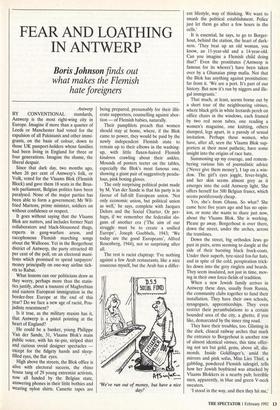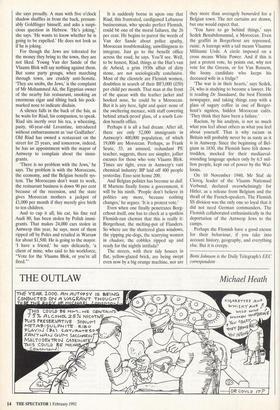FEAR AND LOATHING IN ANTWERP
Boris Johnson finds out
what makes the Flemish hate foreigners
Antwerp BY CONVENTIONAL standards, Antwerp is the most right-wing city in Europe. Imagine if more than a quarter of Leeds or Manchester had voted for the expulsion of all Pakistanis and other immi- grants, on the basis of colour, down to those UK passport-holders whose families had been living in England for three or four generations. Imagine the shame, the liberal despair.
Since that dark day, two months ago, when 26 per cent of Antwerp's folk, or Volk, voted for the Vlaams Blok (Flemish Block) and gave them 18 seats in the Brus- sels parliament, Belgian politics have been paralysed. None of the major parties has been able to form a government; Mr Wil- fried Martens, prime minister, soldiers on without confidence or respect.
It goes without saying that the Vlaams Blok are nutters, and includes former Nazi collaborators and black-blousoned thugs, experts in gang-warfare arson, and cacophonous Flemish marching songs about the Walloons. Yet in the Borgerhout district of Antwerp, the party attracted 40 per cent of the poll, on an electoral mani- festo which promised to spend taxpayers' money principally on one-way airline tick- ets to Rabat.
What lessons can our politicians draw as they worry, perhaps more than the statis- tics justify, about a tsunami of Maghrebian and eastern European immigration in the border-free Europe at the end of this year? Do we face a new age of racist, Pou- jadiste resentment?
Is it true, as the military maxim has it, that Antwerp is a pistol pointing at the heart of England?
He could be a banker, young Philippe Van der Sande, 31, Vlaams Blok's main public voice, with his tie-pin, striped shirt and curious ovoid designer spectacles — except for the fidgety hands and sleep- filled eyes, the flat eyes.
High above the streets, the Blok office is alive with electoral success, the rhino house tang of 29 young extremist activists, now all funded by the Belgian state, answering phones in their little bothies and wearing nylon shirts. Cassette tapes are
being prepared, presumably for their illit- erate supporters, counselling against abor- tion — of Flemish babies, naturally.
Their pamphlets preach that women should stay at home, where, if the Blok came to power, they would be paid by the newly independent Flemish state to remain up to their elbows in the washing- up, with little flaxen-haired Flemish kinderen crawling about their ankles. Mounds of posters teeter on the tables, especially the Blok's most famous one, showing a giant pair of suggestively pendu- lous, pink boxing gloves.
The only surprising political point made by M. Van der Sande is that his party is in favour of full-tilt European union. 'Not only economic union, but political union as well,' he says, complete with Jacques Delors and the Social Charter. Or per- haps, if we remember the federalist slo- gans of another era (`The aim of our struggle must be to create a unified Europe', Joseph Goebbels, 1943; 'We today are the good Europeans', Alfred Rosenberg, 1944), not so surprising after all.
The rest is racist claptrap: 'I've nothing against a few Arab restaurants, like a nice couscous myself, but the Arab has a differ- 'We've run out of money, but have a nice day!' ent lifestyle, way of thinking. We want to smash the political establishment. Police just let them go after a few hours in the cells.'
It is essential, he says, to go to Borger- hout, behind the station, the heart of dark- ness. 'They beat up an old woman, you know, an 11-year-old and a 14-year-old. Can you imagine a Flemish child doing that?' Even the prostitutes ('Antwerp is famous for its whores') have been taken over by a Ghanaian pimp mafia. Not that the Blok has anything against prostitution: far from it. 'We are a port. It's part of our history. But now it's run by niggers and ille- gal immigrants.'
That much, at least, seems borne out by a short tour of the neighbouring vitrines, where black girls in white leotards perch on office chairs in the windows, each framed by two red neon tubes, one reading a women's magazine, one knitting, others slumped, legs apart, in a parody of sexual invitation. Perhaps these women, who have, after all, seen the Vlaams Blok sup- porters at their most pathetic, have some insight into the origins of race hate.
Summoning up my courage, and remem- bering various bits of journalistic advice ('Never give them money'), I tap on a win- dow. The girl's eyes joggle, fever-bright, and her skin seems almost grey as it emerges into the cold Antwerp light. She offers herself for 500 Belgian francs, which seems pestiferously cheap.
Yes, she's from Ghana. So what? She came here five years ago and has no opin- ion, or none she wants to share just now, about the Vlaams Blok. She is working. Please go away. Borgerhout is over there, down the street, under the arches, across the tramlines.
Down the street, big orthodox Jews go past in pairs, arms seeming to dangle at the side of their bursting black frock-coats.
Under their superb, tyre-sized fox-fur hats, and in spite of the cold, perspiration trick- les down into the grey ringlets and beards. They seem insulated, not just in time, mov- ing in their own force-fields of tradition.
When a new Jewish family arrives in Antwerp these days, usually from Russia, the community clubs together to fund their installation. They have their own schools, synagogues, apprenticeships. They even restrict their perambulations to a certain bounded area of the city, a ghetto, if you like, demarcated by the inner ring road.
They have their troubles, too. Glinting in the dark, cloacal railway arches that mark the entrance to Borgerhout is another row
of almost identical vitrines, this time offer- ing not sex but gold, gems, above all, dia-
monds. Inside Goldfinger's, amid the mirrors and pink sofas, Miss Lies Thiel, a gabbling, powdered Flemish salesgirl, tells how her Jewish boyfriend was attacked by Vlaams Blokkers in a nearby pub; horrible men, apparently, in blue and green V-neck sweaters.
'I stood in the way, and then they hit me,' she says proudly. A man with five o'clock shadow shuffles in from the back, presum- ably Goldfinger himself, and asks a suspi- cious question in Hebrew. 'He's joking,' she says. 'He wants to know whether he is going to be expelled.' He does not look as if he is joking.
For though the Jews are tolerated for the money they bring to the town, they are not liked. Young Van der Sande of the Vlaams Blok will say nothing against them. But some party groups, when marching through town, are crudely anti-Semitic. 'They are snobs, the Jews,' is the complaint of Mr Mohammed Ali, the Egyptian owner of the nearby Isis restaurant, smoking an enormous cigar and tilting back his pock- marked nose to indicate disdain.
A silence falls in the back of the Isis, as he waits for Riad, his companion, to speak. Riad sits inertly over his tea, a wheezing, pasty, 60-year-old Levantine, introduced without embarrassment as 'our Godfather'. Old Riad has owned a restaurant on the street for 25 years, and tomorrow, indeed, he has an appointment with the mayor of Antwerp to complain about the immi- grants.
'There is no problem with the Jews,' he says. The problem is with the Moroccans, the economy, and the Belgian benefit sys- tem. The Moroccans don't want to work, the restaurant business is down 90 per cent because of the recession, and the state gives Moroccan mothers a jackpot of £1,000 per month if they merely give birth to ten children.
And to cap it all, his car, his fine red Audi 80, has been stolen by Polish immi- grants. That makes 24,000 cars stolen in Antwerp this year, he says, most of them ripped off by Poles and retailed in Warsaw for about $1,500. He is going to the mayor. 'I have a friend,' he says delicately, 'a client of mine, who said to his workforce, "Vote for the Vlaams Blok, or you're all fired." It is suddenly borne in upon one that Riad, this frustrated, cardiganed Lebanese businessman, who speaks perfect Flemish, could be one of the moral failures, the 26 per cent. He begins to parrot the words of Van der Sande about police apathy, Moroccan troublemaking, unwillingness to integrate. Just go to the benefit office across the road, he says. You'll see. Well, to be honest, Riad, things at the Hur's van de Arbeid, a grim 1930s affair of dirty stone, are not sociologically conclusive. Most of the clientele are Flemish women, doubtless in search of their BF3,000 (£50) per child per month. That man at the front of the queue with the leather jacket and hooked nose, he could be a Moroccan. But it is airy here, light and quiet: none of the sweltering menace, with staff cowering behind attack-proof glass, of a south Lon- don benefit office.
Perhaps it is all a bad dream. After all, there are only 52,000 immigrants in Antwerp's 400,000 population, of which 19,000 are Moroccan. Perhaps, as Frank Seute, 33, an amused, redundant PE teacher, suggests, there are simpler, jollier excuses for those who vote Vlaams Blok. Times are tight, even in Antwerp's vast chemical industry: BP laid off 400 people yesterday. Esso sent home 200.
And Belgian politics has become so dull. If Martens finally forms a government, it will be his ninth. 'People don't believe in politics any more, because nothing changes,' he argues. 'It is a protest vote.'
Even when one finally penetrates Borg- erhout itself, one has to check at a spotless Flemish-run chemist that this is really it: Borgerhout, the melting-pot of Flanders. So where are the shattered glass windows, the yipping pie-dogs, the scurrying women in chadors, the cobbles ripped up and ready for the nightly intifada?
The streets, with their tidy houses in flat, yellow-glazed brick, are being swept even now by a big orange machine, nor are they more than averagely bemerded for a Belgian town. The net curtains are drawn, but one would expect that.
'You have to go behind things,' says Sedek Benabdessamad, a Moroccan. Even the graffiti in Borgerhout are repressed, runic. A lozenge with a tail means Vlaamse Militante Urde. A circle imposed on a cross means White Power. And if this is just a protest vote, he points out, why not vote for the Greens, or for Van Rossem, the loony candidate who keeps his deceased wife in a fridge?
The war is in their hearts,' says Sedek, 24, who is studying to become a lawyer. He is reading De Standaard, the best Flemish newspaper, and taking things easy with a glass of sugary coffee in one of Borger- hout's signless, hidden Moroccan cafes. 'They think they have been a failure.'
Racism, by his analysis, is not so much what you feel about others as what you feel about yourself. That is why racism in Britain will probably never be as nasty as it is in Antwerp. Since the beginning of Bel- gium in 1830, the Flemish have felt down- trodden, mocked for their mediaeval- sounding language spoken only by 6.5 mil- lion people, kept out of power by the Wal- loons.
On 10 November 1940, Mr Staf de Clercq, leader of the Vlaams Nationaal Verbond, declared overwhelmingly for Hitler, as a release from Belgium and the thrall of the French-speakers. The Flemish SS division was the only one so loyal that it did not need German commanders. The Flemish collaborated enthusiastically in the deportation of the Antwerp Jews to the camps.
Perhaps the Flemish have a good excuse for their behaviour, if you take into account history, geography, and everything else. But it is creepy.
Boris Johnson is the Daily Telegraph's EEC correspondent



















































 Previous page
Previous page